 MyDogBreeds
MyDogBreeds West Siberian Laika is originated from Russia but Kuvasz is originated from Hungary. West Siberian Laika may grow 15 cm / 5 inches shorter than Kuvasz. West Siberian Laika may weigh 29 kg / 63 pounds lesser than Kuvasz. Both West Siberian Laika and Kuvasz has almost same life span. Both West Siberian Laika and Kuvasz has almost same litter size. West Siberian Laika requires Low maintenance. But Kuvasz requires Moderate maintenance
West Siberian Laika is originated from Russia but Kuvasz is originated from Hungary. West Siberian Laika may grow 15 cm / 5 inches shorter than Kuvasz. West Siberian Laika may weigh 29 kg / 63 pounds lesser than Kuvasz. Both West Siberian Laika and Kuvasz has almost same life span. Both West Siberian Laika and Kuvasz has almost same litter size. West Siberian Laika requires Low maintenance. But Kuvasz requires Moderate maintenance
 The West Siberian Laika come from the Khanty and Mansi tribes of West Siberia and Ural. They are a primitive breed used for hunting and come from the spitz and wolf lines. They retain many of their primitive looks and traits to this day. They were pre-historic companions to human hunters and remain so today in the northern regions of the Russia. They were never sled dogs but pure hunters throughout their journey to a domesticated breed. They hunted in the forests of the mountainous regions and were adapted to hunting in the woods. When their prey was hunted almost to extinction, the Laikas were also in danger of disappearing.
The West Siberian Laika come from the Khanty and Mansi tribes of West Siberia and Ural. They are a primitive breed used for hunting and come from the spitz and wolf lines. They retain many of their primitive looks and traits to this day. They were pre-historic companions to human hunters and remain so today in the northern regions of the Russia. They were never sled dogs but pure hunters throughout their journey to a domesticated breed. They hunted in the forests of the mountainous regions and were adapted to hunting in the woods. When their prey was hunted almost to extinction, the Laikas were also in danger of disappearing.
From the early days of the 1900’s through the first World War, there were several campaigns to save the WSL from extinction. A breed standard was developed around the 1930’s. Following the war the breeding programs became more uniformed and followed the standard that was in place. World War II disrupted it again, but once again it was resumed after the war.
The breed was once again threatened by industrialization and deforestation in the early 20th century, as they were replaced by newer, more popular breeds. There were thought to be dozens of aboriginal Laikas with various groups attached to different groups of indigenous hunters.
Following the second World War and the ever increasing detail of breed standards, the Laikas were divided into four pure bred groupings: the West Siberian Laika, the East Siberian Laika, the Russ-European Laika and the Karelo-Finnish Laika. All of these breeds are Laikas because they are bark pointing hunters.
They were imported to the U.S. in the early 1990’s by a Russian immigrant. Vladmir Beregovoy is credited with bringing the breed to the States. There are now about 300-400 West Siberian Laika’sin the U.S. They are a very emotional breed, very in touch with his human’s feelings, habits and intentions. He is a barker for sure who hates to be left alone. An intense breed with the need for companionship and a purpose. They will do anything to escape a pen if left alone for long periods of time.
The breed is protective of its people with other animals and some are wary of strangers. He needs an active family to match his active spirit. They will bark at all wild life including all the squirrels in your yard. So if don’t want a “barker”, don’t get a West Siberian Laika.
They are recognized by the United Kennel Club, the American Canine Association the Dog Registry of American and the Federation Cynologique Internationale
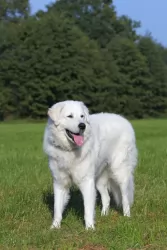 The Kuvasz is an ancient dog breed from Hungary. It is believed that the dog is the oldest of the ancient Hungarian dog breeds, and in fact a fossilized skeleton dating back to the 9th century, and almost identical to the modern Kuvasz, was found near Keszthely.
The Kuvasz is an ancient dog breed from Hungary. It is believed that the dog is the oldest of the ancient Hungarian dog breeds, and in fact a fossilized skeleton dating back to the 9th century, and almost identical to the modern Kuvasz, was found near Keszthely.
During the 15th century the Kuvasz became very sought after, being found in royal courts. Puppies were given as royal gifts. Later the popularity of the breed waned and then it was found in its traditional role of guarding livestock.
As Kuvasz numbers dwindled, breeding efforts were started but it is believed that other large dogs such as the Great Pyrenees were used with the Kuvasz to continue with the breeding programs.
In 1884, the first Hungarian standard for the breed was written. It was in 1966 that the Kuvasz Club of America was established.
 The WSL comes from the Spitz line and also directly descendent from the wolf. They look and act a lot like a wolf in many ways. They have retained much of their primitive traits. With a pointed, long muzzle, an almost square head, and square body, they have wolf colored coats of gray and red. They are mostly medium in size but some can be smaller or larger. Their head is shaped like a wedge, their eyes are typical almond shape and set deep in their head. They are brown or even darker. The muzzle is almost as long as the skull. Their lips are thin and black. The ears are straight up and pricked.
The WSL comes from the Spitz line and also directly descendent from the wolf. They look and act a lot like a wolf in many ways. They have retained much of their primitive traits. With a pointed, long muzzle, an almost square head, and square body, they have wolf colored coats of gray and red. They are mostly medium in size but some can be smaller or larger. Their head is shaped like a wedge, their eyes are typical almond shape and set deep in their head. They are brown or even darker. The muzzle is almost as long as the skull. Their lips are thin and black. The ears are straight up and pricked.
They have bodies longer than they are tall with a lot of musculature. They carry their tail high over their backs. With straight legs and forward feet, with gray, red and white coats, they still look like wild dogs.
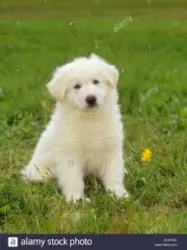 The beautiful Kuvasz is a large, muscled dog standing at 65 – 76cm in height and weighing 35 – 52kg. He has a double coat of dense white hair which can be straight or wavy.
The beautiful Kuvasz is a large, muscled dog standing at 65 – 76cm in height and weighing 35 – 52kg. He has a double coat of dense white hair which can be straight or wavy.
It is natural for the dog to lose most of the long coat during the Summer months. In other words this dog has a seasonal coat.
The nose is black, the eyes brown and alert, the ears are of medium length and floppy and the tail is carried long and low.
The Kuvasz is an intelligent dog who will benefit from training and socialization. It is always wise to have large dogs like this trained because just his size can cause problems if he isn’t obedient.
He is also described as a clownish type of dog which means he’ll entertain and amuse you. Certainly he is playful as a puppy but he calms down quite a bit as he grows into maturity. He is independent, and those who have owned such a dog report that he can be loving and loyal with his human family, wanting to guard and protect them. Others will say that he tended to be aloof, even with his human family.
Used as working dogs, the Kuvasz has learned to be independent and they will need a firm, strong owner who is also fair with them, otherwise they just do their own thing. They’re active dogs and because of their size they won’t suit city living where there is a tiny garden.
 3.Adaptability This is not really an apartment dog though he can adapt. He needs outdoor space to run everyday. So if in an apartment find a dog park for everyday use.
3.Adaptability This is not really an apartment dog though he can adapt. He needs outdoor space to run everyday. So if in an apartment find a dog park for everyday use.
4.Learning ability – Highly trainable and very smart. Independent thinker though might cause some issues.
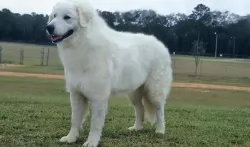 Kuvasz are guarding dogs, they’re intelligent and loyal, making them excellent family dogs with the right training and socialization.
Kuvasz are guarding dogs, they’re intelligent and loyal, making them excellent family dogs with the right training and socialization.
They’re able to get on well with other pets in the home as well as children. He is a beautiful dog and another bonus is that he isn’t particularly high maintenance.
As is common with many other large-breed dogs, he will have a shorter lifespan than what you’d get with a smaller dog breed, but if you feed him high quality food, exercise him and involve him in your activities, this large dog can become a wonderful friend and protector for you.
 Health wise there are no genetic health issues known today. Since they were so wild, primitive and isolated there was not a lot of inbreeding to any standards. There are however some interesting health facts about the WSL.
Health wise there are no genetic health issues known today. Since they were so wild, primitive and isolated there was not a lot of inbreeding to any standards. There are however some interesting health facts about the WSL.
• Females only come into estrus once a year, usually in the late winter. They are usually one to two or two and a half years old when this happens. The Russians who know them best frown on breeding them before they are at least two.
• They are subject to many of the same parasites and some diseases like any other canine. But they are not susceptable to any illness specific to their breed.
• Hunting accidents might bet he biggest health threat this breed faces at the moment.
• However with more dogs being bred for the show ring, this could all change and genetic issues could begin to pop up for them.
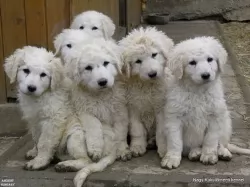 The large Kuvasz is a healthy dog breed that with good care can reach 12–14 years of age. Being the large dog that he is, he may well be prone to bone and joint problems. It is why good nutrition is so important for this dog - feeding him the best food with vitamins and minerals.
The large Kuvasz is a healthy dog breed that with good care can reach 12–14 years of age. Being the large dog that he is, he may well be prone to bone and joint problems. It is why good nutrition is so important for this dog - feeding him the best food with vitamins and minerals.
You know the saying ...you are what you eat... and this applies to dogs too. Good food can help to ward off serious illnesses. Big dogs like this often have to contend with hip dysplasia which can be both painful and debilitating as well as eye diseases.
This is where the eyelid of the dog rolls inwards, causing irritation and pain for the dog. There is also Ectropion, where the eyelid rolls outwards.If you see your pet has a red eye which is watery and which has pus, visit your vet. Entropion surgery will correct and repair and condition.
 performance, working dog food. High in protein and fat is needed to maintain their lean muscle. Don’t over feed them as they will become obese and they will be unhappy if their physical activities are restricted, even if by their own weight. Be sure you break up their day’s food amount into 3-4 smaller meals.
performance, working dog food. High in protein and fat is needed to maintain their lean muscle. Don’t over feed them as they will become obese and they will be unhappy if their physical activities are restricted, even if by their own weight. Be sure you break up their day’s food amount into 3-4 smaller meals.
2.Feeding the adult – Almost everything is equally true for the adult. They need a high protein and high fat food – a high performance food. Don’t over feed and give them at least 2 meals per day.
3.Points for Good Health – as previously mentioned this is a hardy and robust breed,
4. Games and Exercises They need a lot of exercise, have a strong prey drive and are very intelligent. A dog with those traits that does not get enough exercise will drive you crazy if he is not stimulated.
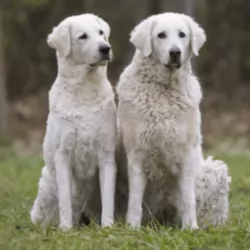 The coat may be fairly long and thick but it doesn’t require any special kind of grooming. A good brush twice a week will be adequate and will help with getting rid of stubborn knots and matting.
The coat may be fairly long and thick but it doesn’t require any special kind of grooming. A good brush twice a week will be adequate and will help with getting rid of stubborn knots and matting.
He is a seasonal shedder and this frequent brushing will make sure the coat remains groomed and shiny.
The Kuvasz is a hardy breed who just loves the outdoors. He is a dog that doesn’t do well in the heat. Make absolutely sure that he has a cool, sheltered spot where he can lie down. Ensure that there is always a bowl of fresh, cool water available to him.
There is quite a bit of conflict and controversy regarding nutrition in dogs. The idea is to keep it simple. If you buy a commercially manufactured dog food, check the ingredients on the packaging.
You want to be sure your pet is getting vitamins and minerals in instead of preservatives, fillers and colorants. Try and give him some home made food too such as some chicken, brown rice or pasta and some vegetables. You can mix this into his dry kibble occasionally with a little bit of raw meat too when you have.
Avoid feeding your dog things such as chocolates, nuts, onions, sweets and chips.